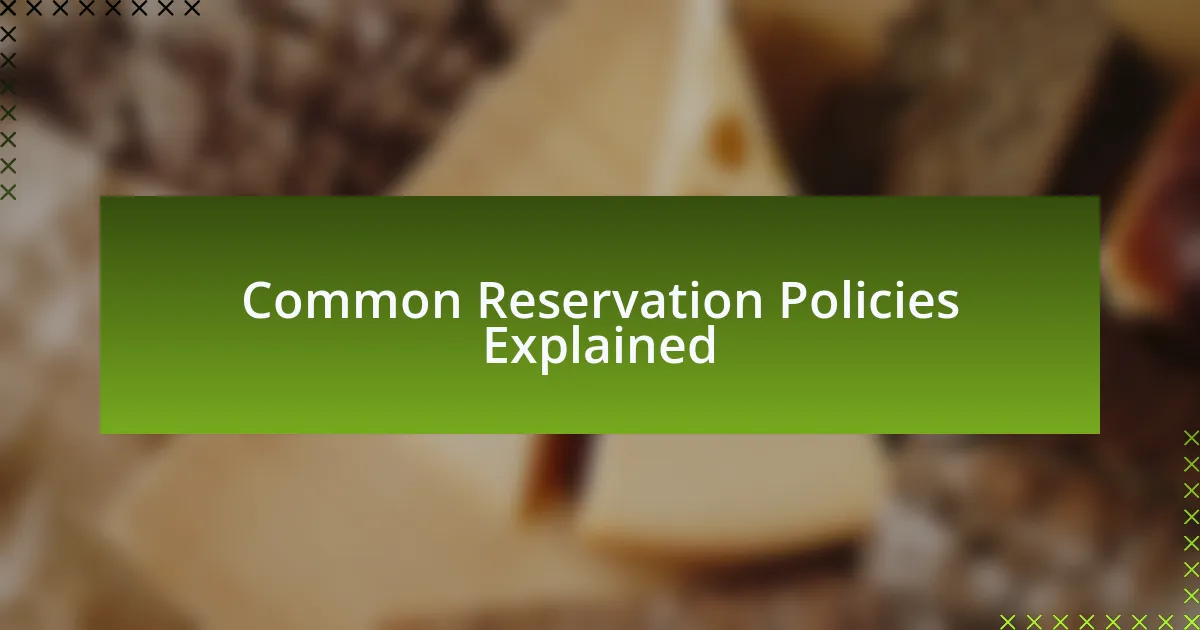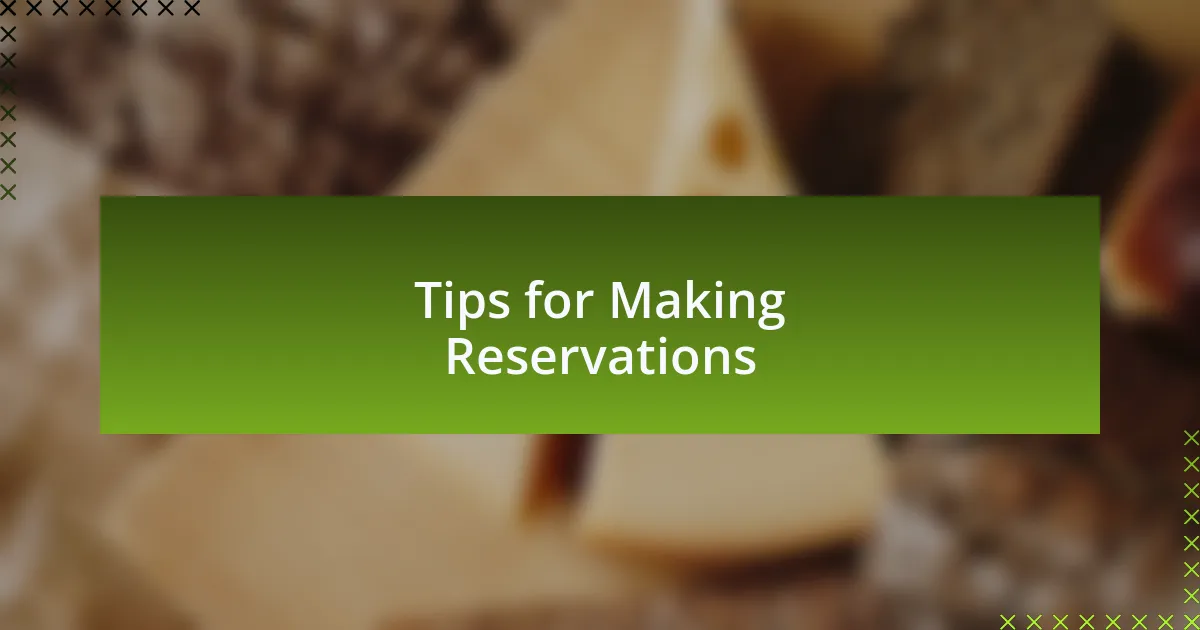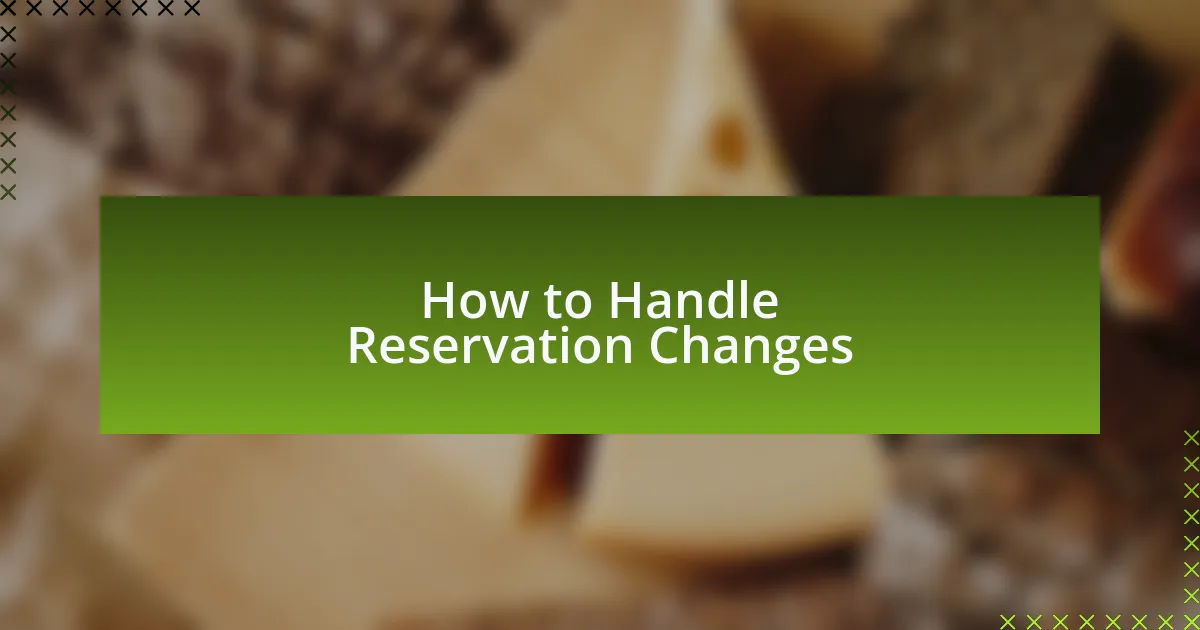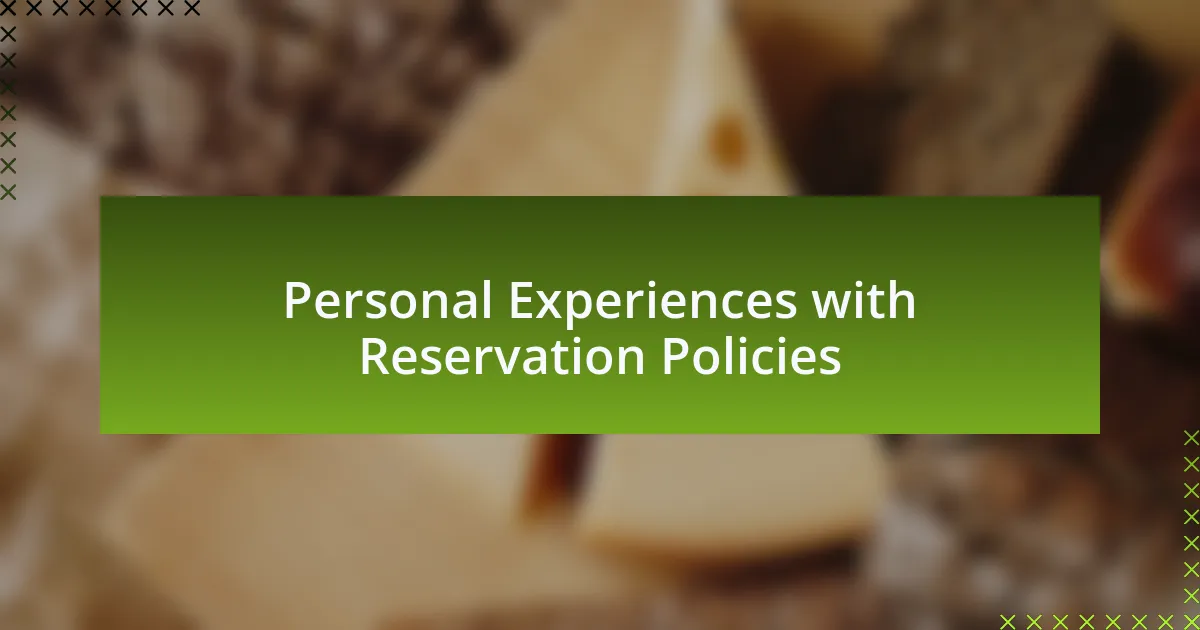Key takeaways:
- Understanding reservation policies, including deposits and cancellation fees, is essential to avoid disappointment and enhance the dining experience.
- Communicating changes promptly with restaurants can lead to more flexible accommodations and reduce stress when plans change.
- Using online reservation platforms and being specific about requests can improve one’s chances of securing desired dining experiences.
- Being polite and understanding can sometimes result in unexpectedly positive outcomes, such as being accommodated without a reservation.

Understanding Reservation Policies
Understanding reservation policies is crucial for both peace of mind and planning your dining experience. I still remember a time when I made the mistake of not checking the cancellation policy of a restaurant I was excited to visit. I had to cancel for personal reasons and ended up losing a deposit, which was quite disheartening. It made me realize just how important it is to thoroughly understand these policies before committing.
Consider this: have you ever shown up to a restaurant only to find your table wasn’t ready because they had a strict time limit on reservations? This happened to me at a fine dining venue, and it can really throw off your entire evening. Most establishments have specific guidelines regarding seating times, no-shows, and deposits, ensuring they can manage their reservations effectively while providing the best service possible.
I find that checking the FAQ section on a restaurant’s website can often clarify a lot about their reservations. It’s like peeking behind the curtain of how they operate and why they have particular policies in place. Understanding these nuances not only enriches your dining experience but also fosters respect for the restaurant’s efforts to serve you well.

Common Reservation Policies Explained
When it comes to fine dining, one common reservation policy revolves around deposits. Many upscale restaurants require a deposit for special events to secure your reservation. I once made a reservation for a special anniversary dinner and was surprised to learn that a deposit was necessary. While it felt a little daunting initially, I appreciated the restaurant’s commitment to ensuring commitment from guests, which ultimately adds to the exclusivity of the experience.
Another frequent policy is related to cancellation and no-show fees. I recall planning a significant dinner for my family, and, due to unforeseen circumstances, we had to cancel. When I discovered that the restaurant had a strict no-show policy, I understood the rationale behind it—after all, the restaurant could have filled that table with another guest. It made me think: how often do we consider the ripple effects our decisions can have on a small business?
Seating time limits are also prevalent in fine dining settings. Many restaurants allocate a specific duration for each reservation slot to optimize service and accommodate as many guests as possible. I remember when I was given a time limit on a previous visit, and at first, I felt rushed. However, this experience taught me the importance of planning and being mindful of the flow of the evening. It’s fascinating how these policies are designed not just for the restaurant’s benefit but also to enhance the overall experience for diners by maintaining a lively, efficient atmosphere.

Tips for Making Reservations
When making reservations at a fine dining restaurant, it’s essential to consider the time of day you’re booking. From my experience, peak dining hours tend to fill up quickly. I often find that the earlier or later I can dine, the more flexibility I have with my options. Have you ever waited weeks for a specific reservation only to find it booked solid during dinner rush?
Another helpful tip is to be as specific as possible when making your request. For instance, let the restaurant know if you’re celebrating a special occasion or have any dietary restrictions. I remember mentioning my vegetarian preferences during a reservation, and the chef personally crafted a delightful dish just for me. How great is that? It’s these little details that can elevate the dining experience significantly.
Lastly, using online reservation platforms can streamline the process tremendously. I’ve often found that these services provide real-time availability, which saves me from the back-and-forth of phone calls. If you want to snag a prime table at a renowned restaurant, booking a few weeks in advance can often make all the difference. Do you think a proactive approach to reservations pays off? In my case, it certainly has!

How to Handle Reservation Changes
When it comes to changing reservations, communication is key. I’ve learned that reaching out as soon as possible can make all the difference. Once, I had to adjust a dinner reservation due to an unexpected schedule change; I called the restaurant directly and explained my situation. Fortunately, they were understanding and shifted my booking without any hassle. How often do we let anxiety about changes prevent us from making that call?
In some instances, fine dining restaurants might have specific policies regarding reservation changes. I remember being surprised to discover that some places have a grace period for adjustments. Being aware of these details can alleviate stress when plans shift unexpectedly. It’s a good idea to familiarize yourself with the restaurant’s policy beforehand—naivety can often lead to disappointment.
One thing I find incredibly useful is to have alternative dates or times ready in case my first choice isn’t available. This approach shows flexibility and can foster goodwill with the restaurant staff. I’ve had moments where suggesting a new time not only worked out but also secured an even better table than I initially booked. Have you ever had a last-minute change lead to an unexpectedly delightful experience? It can be quite serendipitous!

Personal Experiences with Reservation Policies
I remember a time when I made a reservation for a special occasion at a renowned fine dining restaurant. I was thrilled, but just days before, I realized I accidentally forgot to confirm the reservation. I reached out, my heart racing, but to my surprise, they had no problem accommodating me. This experience taught me the importance of confirming my reservations—there’s something reassuring about knowing everything is set.
On another occasion, I found myself navigating a strict cancellation policy. I had to cancel last minute due to a family emergency, and I braced myself for a conflict. Instead, the manager was empathetic and allowed me to reschedule for a later date without any penalty. This reinforced my belief that, when treated with honesty and respect, most establishments will reciprocate that kindness.
I’ve also encountered a situation where I tried to dine at a popular restaurant on a whim without a reservation. As I stood at the entrance, I felt a mix of hope and anxiety. Thankfully, after a brief wait and a little charm, the staff managed to squeeze me in. That experience not only delighted me but also highlighted how being polite and understanding can sometimes lead to unexpected opportunities. Have you ever found yourself in a similar situation, where a little patience turned into a memorable dining experience?

Navigating Reservations at Popular Restaurants
Navigating reservations at popular restaurants can often feel like a high-stakes game of chance. There was one evening I attempted to secure a table at a trending venue. I logged onto their website minutes after the reservations opened, only to find every time slot snatched up within moments. This experience underscored how competitive dining can be and the necessity of being quick on the draw if you want to enjoy a meal at a coveted spot.
I’ve also learned the nuances of reservation systems that vary widely among establishments. At one upscale restaurant, I discovered they offered a tiered system for reservations, where you could pay a small fee to secure a table during peak hours. Initially, I hesitated at the thought of paying for a reservation, but I ultimately signed up and ended up enjoying a seamless dining experience. Have you ever considered that sometimes investing a little can elevate your experience?
Then, there was that unforgettable time when I dined at a highly acclaimed restaurant. I had to navigate their digital booking platform, which felt more complex than I anticipated. After several clicks, I finally secured a spot. When I arrived, however, I was met with a warm welcome and instantly felt at ease. It made me reflect on how user-friendly reservation systems can enhance the overall dining vibe. How do you feel when technology plays a role in your dining adventures?